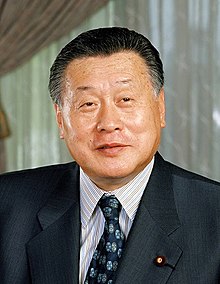Tokyo 2020 Olympic organizing committee head Yoshiro Mori attended meetings in Sapporo Nov. 7 with Hokkaido governor Naomichi Suzuki and Sapporo mayor Katsuhiro Akimoto to ask them for their support and cooperation in holding the Olympic marathons and race walk events in Sapporo after the IOC dictated that this happen. Indicating for the first time that neither the city nor prefecture would be asked to pay for the events, Mori said, “We want to make sure that there is no burden placed upon Hokkaido.”
At a meeting about the road events’ forced move to Sapporo between the IOC, national government, Tokyo Metropolitan Government and Tokyo Olympics organizing committee on Nov. 1, it was agreed that the Tokyo Metropolitan Government would not shoulder the costs of the IOC’s decree. The IOC had said that Hokkaido and Sapporo should share in paying for the cost of the events’ relocation, but in the meeting with Mori on Nov. 7 the Governor and Mayor reiterated their position that, “It is the basic responsibility of the Organizing Committee to pay for this.” Mori indicated that the situation is still fluid, answering that, “At the moment I can’t say where the money will come from.”
With regard to the men’s marathon, scheduled to be held on the final day of the Olympics, Aug. 9, as per tradition, Mori said, “There will be significant changes to the schedule.” Mori said that given the need to budget time for antidoping after the men’s marathon, the IOC’s plan to transport athletes back to Tokyo in time for the closing ceremonies was unrealistic. “The current plan is impossible,” he said. “We need to change the event’s schedule.” The IAAF is currently planning to reduce the road event schedule from five to three days as a cost-saving measure. “We hope to get this straightened out as soon as we can,” said Mori.
On Nov. 8 organizing committee secretary general Toshiro Muto will visit Sapporo and examine Odori Park, currently viewed as the most likely starting and finishing point for the marathon. He will hold working-level meeting with prefectural and city government officials.
source article:
newstf.x-day.tokyo/?p=15333
translated and edited by Brett Larner

At a meeting about the road events’ forced move to Sapporo between the IOC, national government, Tokyo Metropolitan Government and Tokyo Olympics organizing committee on Nov. 1, it was agreed that the Tokyo Metropolitan Government would not shoulder the costs of the IOC’s decree. The IOC had said that Hokkaido and Sapporo should share in paying for the cost of the events’ relocation, but in the meeting with Mori on Nov. 7 the Governor and Mayor reiterated their position that, “It is the basic responsibility of the Organizing Committee to pay for this.” Mori indicated that the situation is still fluid, answering that, “At the moment I can’t say where the money will come from.”
With regard to the men’s marathon, scheduled to be held on the final day of the Olympics, Aug. 9, as per tradition, Mori said, “There will be significant changes to the schedule.” Mori said that given the need to budget time for antidoping after the men’s marathon, the IOC’s plan to transport athletes back to Tokyo in time for the closing ceremonies was unrealistic. “The current plan is impossible,” he said. “We need to change the event’s schedule.” The IAAF is currently planning to reduce the road event schedule from five to three days as a cost-saving measure. “We hope to get this straightened out as soon as we can,” said Mori.
On Nov. 8 organizing committee secretary general Toshiro Muto will visit Sapporo and examine Odori Park, currently viewed as the most likely starting and finishing point for the marathon. He will hold working-level meeting with prefectural and city government officials.
source article:
newstf.x-day.tokyo/?p=15333
translated and edited by Brett Larner


Comments